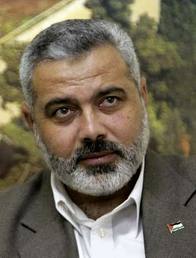2011-02-07 Protests and humanitarian crises in the Gaza Strip and West Bank
 Hundreds of Hamas supporters in Gaza City protested in the streets on February 3 in support of the Eyptian revolutions and against Egypt's president Hosni Mubarak with the apparent tolerance or encouragement of the Hamas government. But later this week, a group of journalists and bloggers who organized their own protest had their protest broken up. Six women and eight men were arrested, and two of the women were beaten.
Hundreds of Hamas supporters in Gaza City protested in the streets on February 3 in support of the Eyptian revolutions and against Egypt's president Hosni Mubarak with the apparent tolerance or encouragement of the Hamas government. But later this week, a group of journalists and bloggers who organized their own protest had their protest broken up. Six women and eight men were arrested, and two of the women were beaten.
In Ramallah rallies were also broken up before they started. The Palestinian Authority police beat protesters with clubs and arrested two at a rally for Egypt in front of the Egyptian embassy on Sunday. "Our rally was simply in support of Egypt," one protester told Ma'an by phone, "we said nothing against the PA, we were not even out in the street." Earlier the same day, the Palestinian Authority had organized a rally in support of Mubarak which accused Egyptian opposition leader Mohammed El Baradei of being a CIA agent. The pro-Mubarak rally attracted a few dozen, the rally for the Egyptian people hundreds.
The rallies now appear to have changed from simply supporting Egypt to including calls for reform in Gaza. A Facebook page appeared on January 28 calling for a revolution in Gaza and naming February 11 a day of protest against the Hamas government. Four days later, another page was set up on Facebook, calling for a revolution in Ramallah and the ouster of President Mahmoud Abbas.
As shown in the US state cables, Egypt has been accused by both the Emir of Qatar and the president of Syria of having no desire for the 'peace process' between Palestine and Israel to come to a conclusion, as that would also conclude his important role as a mediator. "The Egyptians' goal is to stay in the game and maintain their relationship with the U.S., which is built around brokering Middle East peace, for as long as possible." Between January 23 and 26th Al Jazeera released 1,684 files of confidential documents related to the Israeli-Palestinian conflict. These documents also inflamed Palestinian opinions against the Palestinian Authority who were shown as acquiescing to almost all Israeli demands. "Hamas and Islamic Jihad officials said after a meeting of several groups that all were agreed that deals made with Israel by president Mahmud Abbas's western-backed Palestinian Authority and his Fatah movement were invalid."
The current situation in Egypt is having a potentially disastrous impact on residents of the Gaza Strip. The border between Gaza and Egypt is sealed shut, fuel imports have been cut off, and hundreds of people cannot reach medical care or separated family members. Egyptian workers who normally smuggle in fuel have fled to their homes or to fight Egyptian forces. According to Mahmoud al-Shawa, president of the board of directors of the Palestinian Energy and Natural Resources Authority in the Strip, "Gaza needs 800,000 litres of diesel (200,000 for the main power station) and 300,000 litres of petrol daily. Only half of that requirement was available even before the Egyptian uprising. Most of Gaza’s supply must be smuggled through the tunnels from Egypt, since fuel from Israel is not only limited in quantity but too expensive for most residents."
The Rafah crossing between Egypt and Gaza closed on January 30, leaving stranded many people who needed to cross for medical treatment, school, supplies or to be with family and causing the prices of many consumer goods to skyrocket. Although there have been recent reports of the Gaza underground tunnels, or 'feeding tubes', which were used to bring basic goods from Egypt into the Gaza Strip, now working in the opposite direction, the most recent reports say the tunnels are now closed.
Around 60 Palestinians, attempting to return home via Cairo when Gaza's southern border closed, are still being held at Cairo airport. Among them are six children and several critically ill patients who are running out of medication. "The children don't know what's happening. Sometimes they're crying. It's very, very cold here; it's crowded and there is nowhere for us to wash," said one of the being detainees.
The biggest hospital, Shifa Hospital in Gaza City, has less than a week's fuel supply in reserve. Around 500 Gazan patients were referred to Egypt every month before the Rafah crossing closed. The UN is now looking into the possibility of transferring medical cases from Gaza through Israel, although the Office for the Coordination of Humanitarian Affairs predicts at least 20 percent of patients will be refused on security grounds.